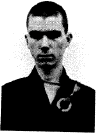|
From the tables down at Mory's to… Bhiksu Heng Ch’ien
|
|
|
Bitter Indian fighting and the struggle to found a railroad empire to open the Pacific Northwest layed the foundation for the wealth into which Dharma Master Heng Pai was born. Born on May 14, 1948, the son of Mr. and Mrs. Herbert Munson, Heng Pai grew up in an affluent and educated environment. |
|
|
Realizing Heng Pai's talents, his family sent him to the best preparatory school in the Northwest where he excelled on the playing field and in the classroom and graduated with honors. He then went on to Yale to study literature. He rowed for the crew and wrote articles for the literary journal and the newspaper. It did not take long, however to penetrate the Ivy facade to discover that the real action at the University was drugs and women. The discovery that the professors were no more Exempt from the lure of such base pursuits than the cream of the national crop and no better than the worst, why go on? Indeed, he did not. He quit going to classes, quit rowing, quit drinking, quit doing anything that anyone he saw did. He tried locking himself in his room with his books, tried Yoga, tried the popular meditation peddled on campus. Nothing could rekindle the spark in him. Like the tortured subject of some Russian novel, he stayed in his room for days on end, brooding. On graduating he fled the East and all memory of his wasted four years behind, determined to start anew, bursting with fresh plans and a reaffirmed faith that life can be good. Life cannot be good, however. The Dharma Master to be soon the Saha world is everywhere the same. He found himself sharing the rooms of an old house in Seattle with four other Reality Seekers, seeking reality through the long narrow stem of a hashish pipe or within the narrow confines of a gelatin capsule amidst the frenetic wailing of three non-stop stereos. It was in the basement of this house that he ran across some back issues of Vajra Bodhi Sea, and decided to pay a visit to the Buddhist Lecture Hall to see what Lord Buddha had to say. Arriving in San Francisco, he found a cheap hotel and began looking for the Buddhist Lecture Hall, having neglected in his haste to copy the address from inside the journal. His first attempt to visit found him hesitating at the top of the stairway, then running back down to the street. On the way down he passed a woman who spoke to him, urging him to return the next day at lunchtime. He did so and after talking with Dharma Master Heng Shou, whom he had known briefly in high school, he decided to attend a seven-day meditation session and moved in the next day. After the session ended, he discussed the future with the Dharma Masters and was deeply impressed with their frank honesty and clear resolve and decided to stay on, continuing to practice meditation and begin study of the Buddhist scriptures. He took refuge with the Triple Jewel and received the Dharma name Kuo Meng. When the building, which is presently known as Gold Mountain Temple, was first purchased in late 1970, he was among the first of those who tackled the enormous task of refurbishing everything within the four wails. During the long sixteen-hour workdays he began the practice of eating once a day. His ability to discipline himself led naturally to more traditional cultivation. In June of this year he put down his hammer and attended the 1971 Summer Lecture and Cultivation Session where he exemplified the firm resolve and diligence that go into forging the awesome manner of the Bhiksu. He further cultivated, above and beyond the regular session schedule, daily recitation of the Great Compassion Mantra and prostrations before the Buddha. After that initial week of meditation in the fall of 1970, he vowed to leave home and follow the life of a Bhiksu, but this did not come to fruition until June 2, 1971, when he received the Sramanera Precepts. Since then he has continued to apply himself vigorously to the teachings of the Sutras, Sastras, and Vinaya in both his study and cultivation. His study of Chinese has been such that he will soon assume full responsibility as a member of The Buddhist Text Translation Society. This winter he will complete his vow to undertake the life of a Bhiksu when he travels to Tz'u Shan Temple in Taichung, Taiwan to receive the Complete Precepts of the Thousand Buddhas, the full Bhiksu Ordination. A prime cause of his misgivings about society was disgust with the emotional folly, which entangled his more romantic peers. Though a source of suffering at the time, this was something for which he would later be greatly thankful. Having observed the transitory nature of existence and noted the flabby state of decay of many still young students, he strove to save himself by means of everything from jogging to organic food to yoga, but soon realized the futility of the struggle. Now, realizing that he was deeply attached to the physical desires of life, he has assumed the cultivation of many ascetic practices, such as eating once a day and sleeping sitting up. As to what results will come of his practices, for himself and for Buddhism, we can only wait and see.
|
|
